Prince Andrew’s Downfall vs Starmer’s Silence: Two Standards, One Elite Club. The Trilateral Commission
🎧 AI Audio Trial: Prince Andrew Takes the Heat (MP3)
Prince Andrew has surrendered his Duke of York title and his Order of the Garter membership. The media cycle churns. Royal commentators solemnly discuss the gravity of the moment. The Palace hopes this latest gesture will finally close the wound.
Meanwhile, Lord Peter Mandelson, recently sacked as the UK’s Ambassador to the United States after barely warming the seat, faces no such reckoning. He remains a member of the Labour Party. He keeps his seat in the House of Lords. He retains his membership in the exclusive organisation that once counted Jeffrey Epstein among its ranks. And most importantly, he faces only a touch of scrutiny enough to scandalise but not to ruin or rock his decades-long career advancing the interests of global capital over British workers, or for his participation in elite networks designed to insulate power from democratic accountability.
Let that sink in. While Andrew is pilloried for his association with Epstein (rightly so), Mandelson glides through yet another scandal, his connections to the same elite circles that protected Epstein never questioned, never examined, never considered disqualifying. He may have lost the Washington posting, but he’s lost nothing that matters. Not his title. Not his party membership. Not his seat at the table where real decisions get made.
And here’s the part the media won’t tell you: Sir Keir Starmer sits at that same table. The Prime Minister of the United Kingdom and Lord Peter Mandelson are both members of the Trilateral Commission, an exclusive club of roughly 400 of the world’s most powerful political and corporate figures. Founded in 1973 by David Rockefeller and Zbigniew Brzezinski, its stated mission was to manage democracy and global capitalism in the interests of “stability.” In practice, that means managing democracy in the interests of the ruling class. Shaping policy behind closed doors. Ensuring that global markets override national sovereignty. Insulating power from the people.
Starmer joined the Trilateral Commission in 2019, whilst serving in Jeremy Corbyn’s shadow cabinet. Let that sink in. Whilst Corbyn was leading Labour on an anti-austerity, anti-war platform that threatened the established order, his own Shadow Brexit Secretary was being inducted into the very organisation designed to prevent such challenges to elite power.
Starmer’s membership wasn’t just a personal choice. It was an act of allegiance, a signal to the ruling class that Labour would soon be safe in his hands.
The Trilateral Commission’s membership list reads like a who’s who of the Western elite. Prime ministers, central bankers, tech magnates, policy shapers. The architects of globalisation. Among them, past and present: Sir Keir Starmer, Lord Peter Mandelson, and yes, Jeffrey Epstein, who mingled freely among its ranks until his death. Even after his conviction for soliciting prostitution from a minor in 2008, Epstein’s name remained on the Trilateral Commission’s membership rolls. It wasn’t removed until after his death in 2019, when the scandal became too toxic to ignore.
This is the true face of Trilateral Commission governance: a system where democratic accountability becomes subordinate to financial flows, where known criminals retain banking services and organisational memberships because of their elite connections, and where public oversight is dismissed as dangerous excess requiring “moderation.” When Commission members occupy the highest offices in multiple nations simultaneously whilst their financial networks enable systematic abuse, we witness not international cooperation but the institutionalisation of oligarchic rule that operates beyond any democratic constraint.
This is not guilt by association. This is a question of principle. What does it say about Labour’s leadership that both the Prime Minister and his chosen ambassador share membership in an organisation built to curb democracy, designed to ensure that unelected elites shape the policies that govern our lives? What does it say that the party that once drew its strength from union halls and picket lines now draws its leadership from the same transnational oligarchy that protected men like Epstein?
Most people know of Epstein’s ties to American power. Clinton, Trump, the morally bankrupt jet set who flew on his private planes and attended his parties. But fewer realise how deep Epstein’s connections stretched into Britain’s political establishment, reaching right into the Labour Party’s upper ranks. Not through direct contact necessarily, but through the networks of power and privilege that Epstein navigated with ease. The Trilateral Commission. The Council on Foreign Relations. Davos. The spaces where democracy goes to die and deals get made.
Prince Andrew’s association with Epstein was personal and direct. He visited Epstein’s properties. He was photographed with Virginia Giuffre. He gave that catastrophic Newsnight interview trying to explain it all away. His conduct deserves every ounce of condemnation it receives. But why does the media’s focus remain so narrow? Why does scrutiny end at the palace gates whilst the Prime Minister and his closest allies participate in the same elite networks that once welcomed Epstein?
The real scandal is not that Mandelson was eventually sacked as US Ambassador. The real scandal is that he was ever appointed in the first place, and the reason becomes crystal clear when you understand that Starmer and Mandelson are not just party colleagues. They are fellow members of the same exclusive club. They attend the same closed-door meetings. They share the same worldview shaped by the same elite gatherings. When Starmer chose Mandelson for Washington, he wasn’t selecting the best person for the job. He was rewarding a fellow Trilateral Commission member, someone who speaks his language, someone who shares his understanding of where real power lies.
How does a man with Mandelson’s record get nominated for one of Britain’s most prestigious diplomatic posts? How does someone who has been forced to resign from Cabinet positions twice, who was instrumental in undermining Jeremy Corbyn through the People’s Vote campaign, who has spent decades advancing the interests of global capital rather than British workers, end up representing this country abroad?
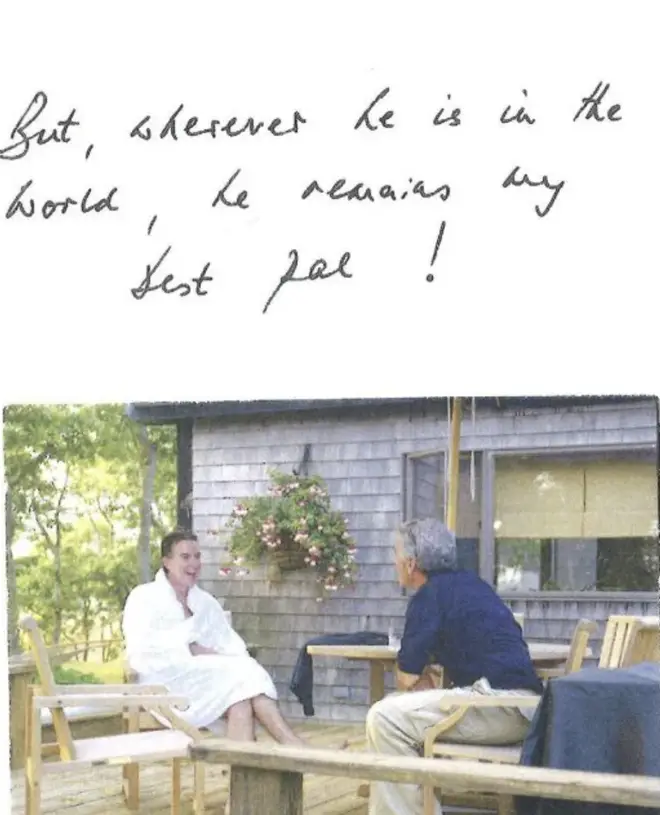
The answer is simple and damning: because Starmer chose him. Because to Starmer and the Labour establishment Mandelson represents, credentials don’t come from serving working people. They come from membership in the right clubs. From knowing the right people. From years spent cultivating relationships with billionaires and bankers and the transnational elite who shape policy away from democratic oversight. Starmer and Mandelson share more than party membership. They share membership in an organisation that explicitly exists to manage democracy, to ensure that no matter who voters elect, certain fundamental arrangements remain unchanged.
Mandelson’s career makes his initial appointment even more inexplicable unless you understand what Labour has become under Starmer’s leadership. This is a man who resigned from government not once but twice. First in 1998 over an undisclosed £373,000 loan from fellow minister Geoffrey Robinson to buy a house. Then again in 2001 over his involvement in passport applications for the billionaire Hinduja brothers, who had donated £1 million to the Millennium Dome project Mandelson oversaw. Both times he claimed he’d done nothing wrong. Both times he had to go anyway because even by the low standards of New Labour, the appearance of corruption was too blatant.
But scandal doesn’t stick when you’re part of the club. Mandelson returned to government as European Trade Commissioner. He became a lord. He spent years representing corporate clients through his consultancy Global Counsel. He positioned himself as Labour’s “prince of darkness,” the master strategist whose contempt for party democracy was matched only by his skill at backroom manoeuvring. And when Corbyn won the leadership, threatening to return Labour to its roots as a party of working people rather than global capital, Mandelson was at the forefront of the coup attempts and the People’s Vote campaign designed to undermine him.
Starmer, meanwhile, was playing both sides. Publicly serving in Corbyn’s shadow cabinet. Privately joining the Trilateral Commission, cementing his relationships with the very forces Corbyn sought to challenge. When Starmer eventually replaced Corbyn, one of his first moves was to bring Mandelson back into the fold. Not officially at first, but as an adviser, a confidant, someone whose expertise in managing Labour’s transformation from a democratic socialist party into a vehicle for elite interests was invaluable.
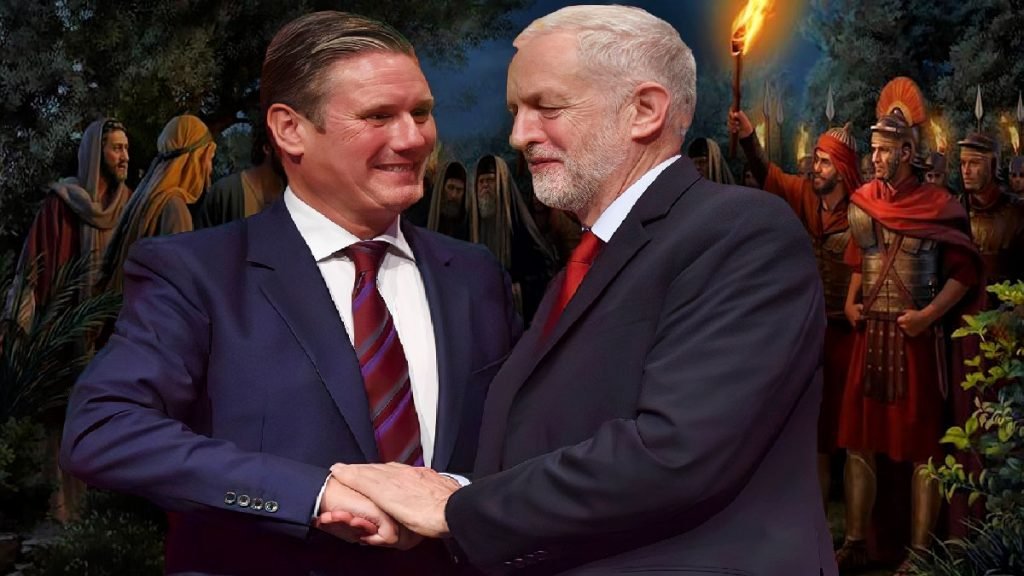
That Starmer chose this man as ambassador revealed everything about this government’s true priorities. It showed who Starmer values, who he trusts, what kind of politics he actually believes in despite the rhetoric about serving working people. Mandelson’s appointment was a signal to the Trilateral Commission, to the global elite, to the networks of power that span continents: Labour under Starmer is safe. It will not challenge the established order. It will not threaten corporate interests. It speaks the language of social justice whilst governing for capital.
The relationship between Starmer and Mandelson isn’t just political. It’s structural. They are both products of the same system, members of the same organisations, believers in the same fundamental principle: that democracy is something to be managed rather than practised, that working people cannot be trusted to make decisions about their own lives, that power must remain in the hands of those who know best. The Trilateral Commission isn’t a conspiracy. It’s an institution. One that both men joined voluntarily, that both continue to participate in, that shapes their worldview and their priorities.
Starmer was eventually forced to remove Mandelson from the Washington posting, but only after the appointment became politically untenable. The sacking wasn’t about principle. It was about damage control. And crucially, Mandelson lost only the position, not his standing. He remains Lord Mandelson. He remains a Labour peer. He remains a member of the Trilateral Commission, right alongside Starmer. He remains connected, influential, protected. Nothing fundamental has changed.
This is what oligarchic rule looks like in practice. Not jackboots and secret police, but networks of elite privilege that operate beyond democratic accountability. Men like Mandelson and Starmer don’t need particular positions to wield power. They wield it through their connections, their club memberships, their ability to pick up the phone and reach anyone who matters. The Washington ambassadorship was just a title. The Prime Minister’s office is just an office. The real power lies in the networks themselves, the Trilateral Commission and organisations like it, where policy is shaped before it ever reaches Parliament.
The late Tony Benn had five questions for anyone wielding power:
What power have you got? Where did you get it from? In whose interests do you use it? To whom are you accountable? How do we get rid of you?
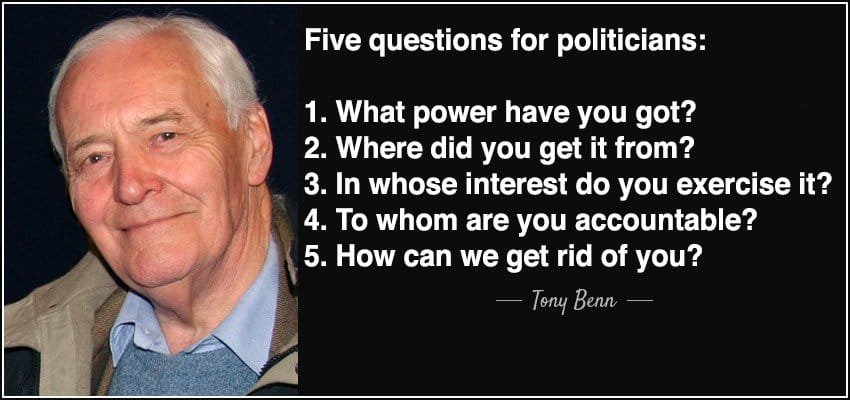
The Trilateral Commission fails every single one. Its members are not elected. They are not accountable to voters. They operate behind closed doors, shaping policy that affects billions whilst answering to no one. Their power comes from wealth and connections, not democratic mandate. Their interests are global capital, not working people. And you cannot get rid of them because you never got to choose them in the first place.
This is the organisation that Starmer and Mandelson proudly join. This is the network they value above party membership, above democratic accountability, above the people they claim to represent. When push comes to shove, their loyalty is to the club, not to you. And this explains everything about how Labour has been transformed. Why Corbyn had to go. Why anti-austerity policies disappeared. Why foreign policy shifted to align with NATO and American interests. Why promises made in opposition evaporate in government. Because Starmer’s real constituency isn’t Labour members or British voters. It’s his fellow Trilateral Commission members, the global elite who meet in Geneva and New York and Washington to ensure that regardless of what voters want, their interests remain protected.
The media will not ask these questions. They’re too busy covering royal scandals, too focused on the spectacle of Andrew’s downfall to notice the rot that festers in plain sight. The newspapers that dedicate pages to dissecting every detail of Andrew’s associations will never mention Starmer and Mandelson’s membership in the same elite circles that protected Epstein. The commentators who demand accountability from the royals will never demand it from the Prime Minister who shares club membership with a twice-resigned minister and a dead sex offender.
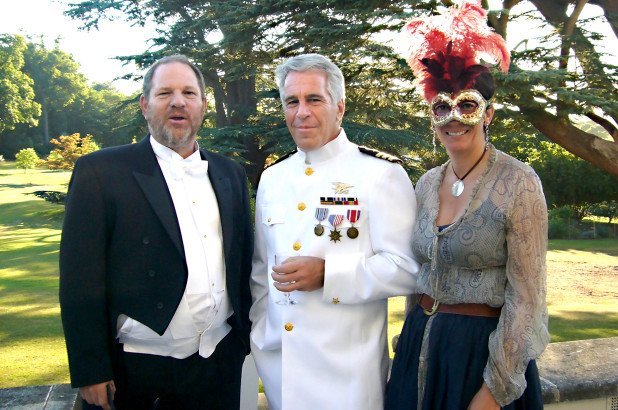
This is not whataboutery. Andrew’s conduct deserves scrutiny and condemnation. But so does the systematic capture of our democracy by unelected elites. So does the transformation of the Labour Party from a vehicle for working-class power into a finishing school for aspiring members of the global ruling class. So does the fact that our Prime Minister and his chosen ambassador (however briefly) are both members of an organisation explicitly designed to limit democracy and concentrate power.
The irony is almost too perfect. Labour, the party that once fought privilege, now embodies it. The party born in defiance of unaccountable power now seeks membership in its most exclusive institutions. The party that promised to represent working people now represents only its own ambitions for seats at tables where ordinary people are never invited. And at the head of this transformed party sits a man who joined the Trilateral Commission whilst serving under a leader who represented everything that organisation opposes.
While Prince Andrew loses his titles and retreats to his mansion, Starmer and Mandelson keep theirs. Starmer keeps Number 10. Mandelson keeps his peerage, his party membership, his seat in the Lords. Both keep their Trilateral Commission membership, their connections, their real power. While the palace performs its theatre of accountability, Labour’s elite face no questions at all about their membership in organisations designed to limit democracy and concentrate power.
One scandal makes headlines. The other is called policy. One man faces public disgrace. The others face occasional setbacks before the next opportunity. One loses ceremonial positions. The others simply wait for the heat to die down whilst continuing to shape policy behind closed doors.
And this is why people no longer trust politics. Because they can see what the media pretends not to notice. That whether you’re born into royalty or climb the ladder of the Labour Party, once you reach a certain level, the same rules apply: protect the club, protect each other, protect the system that keeps ordinary people powerless. Starmer joined that club whilst pretending to serve Corbyn. Mandelson has been part of it for decades. Together, they represent the complete capture of Labour by the forces it was founded to oppose.
The Trilateral Commission stands as a monument to everything Labour once fought against. Unaccountable wealth. Centralised control. Contempt for working-class democracy. That the leader of the Labour Party is a proud member should trouble anyone who still believes democracy means government of the people, by the people, for the people. That he appointed a fellow member to represent Britain abroad should confirm what many already knew: this Labour government serves the elite, not the electorate.
For a deeper dive into Mandelson’s career and what his appointment revealed about Starmer’s Labour, read our full investigation here. For more on Starmer’s Trilateral Commission membership and what it means, see the reporting by Declassified UK.
And why, when the public deserves transparency about these connections, about these organisations, about who our leaders really answer to, is silence the only response? Why do journalists who will spend weeks dissecting royal scandals refuse to investigate the networks of elite power that shape policy behind closed doors? Why is asking about the Trilateral Commission treated as conspiracy theory whilst Andrew’s friendships are front-page news?
The answer is as simple as it is damning: because the media, like the political class, is part of the same system. The editors and columnists and political correspondents move in the same circles, attend the same events, share the same assumptions about how the world should work. They will hold individuals like Andrew accountable because individual scandals don’t threaten the system. But they will not investigate the systematic capture of democracy by unelected elites because that investigation would implicate them too.

Prince Andrew faced scandal. Starmer and Mandelson call it networking. One lost ceremonial titles. The others gained real power. And this reveals everything about how power actually operates in Britain. The scandals that make headlines are the ones that don’t matter. The ones that do matter, the systematic corruption of our democracy by networks of elite privilege, go unreported, uninvestigated, unacknowledged.
And here’s the real kicker: as long as we tolerate this revolving door between government and corporate lobbying, between elected office and unelected influence, between democratic accountability and oligarchic rule, we will never have representative democracy. Or at least not the kind that represents us.
The Trilateral Commission is not the only organisation that operates this way. There are dozens of them. Think tanks funded by billionaires that shape policy papers. Lobby groups that write legislation for MPs too lazy or corrupt to write their own. Consultancy firms that hire former ministers and then sell access to current ones. NGOs with noble-sounding names that advance corporate interests whilst claiming to serve the public good. A whole ecosystem of elite influence that ensures power remains where it’s always been: in the hands of those who already have it.
MPs leave office and join corporate boards. Civil servants retire and become lobbyists. Ministers move seamlessly from government departments to the very industries they once regulated. And they all meet at the same conferences, the same private clubs, the same invitation-only gatherings where the real decisions get made. Davos. The Trilateral Commission. Bilderberg. Places where democracy is discussed as a problem to be managed rather than a principle to be honoured.
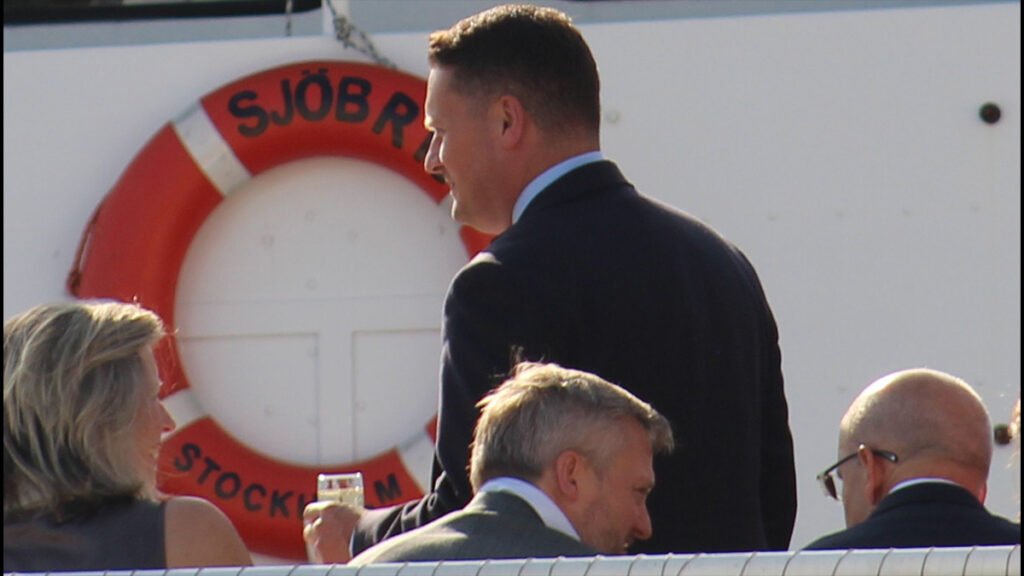
This is why nothing fundamental ever changes. Why austerity continued under different names. Why wars keep happening despite public opposition. Why housing remains unaffordable and wages stagnant and public services crumble whilst the wealthy accumulate obscene fortunes. Because the people making decisions answer to the club, not to you. Their loyalty is to the system that elevated them, not to the voters who elected them.
The tragedy is that many people sense this truth but feel powerless to change it. They see politicians from all parties saying different things in elections but doing similar things in office. They watch scandals erupt and fade without consequences for anyone who matters. They recognise that voting changes faces but not policies, that democracy has become a performance conducted for their benefit whilst real power operates elsewhere.
This despair serves the elite perfectly. If people believe nothing can change, they stop trying to change it. If they think all politicians are the same, they stop holding any of them accountable. If they accept that power will always be corrupt, they stop fighting corruption. The system doesn’t need to suppress dissent when it can simply convince people that dissent is futile.
But it is not futile. The elite fear genuine democracy more than anything else because they know that if working people ever truly organised, ever truly demanded power rather than begged for scraps, the whole structure would collapse. That is why they build these organisations. That is why they create these networks. That is why they work so hard to ensure that no matter who wins elections, their interests remain protected. Because they know their power rests on our compliance, and compliance rests on our belief that nothing better is possible.
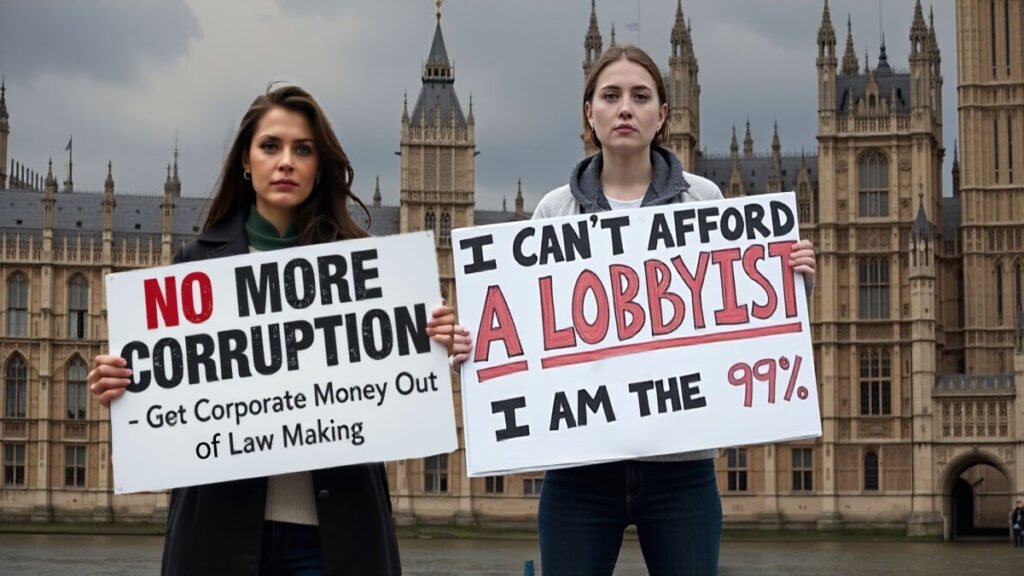
So here is what we must do. We must name these organisations. We must investigate these connections. We must demand that every politician disclose every club membership, every corporate relationship, every source of influence beyond the ballot box. We must treat participation in anti-democratic organisations like the Trilateral Commission as disqualifying for public office. We must build a politics that places working people’s interests above elite priorities, that chooses democratic accountability over oligarchic rule, that refuses to accept that some people deserve more power simply because they were born into it or bought their way into it.
We must ask the questions the media will not ask. We must demand the transparency the elite will not give. We must organise beyond party structures that have been captured by the very forces we need to challenge. We must build movements, not just elect individuals. Because individuals can be bought, can be co-opted, can join the Trilateral Commission whilst pretending to serve the people. But movements rooted in working-class power cannot be managed away.
The choice is stark and it is urgent. Either we reclaim democracy from the networks of elite privilege that have captured it, or we accept that we live in an oligarchy with elections, a system where we choose between pre-approved options whilst real power remains forever out of reach.
Prince Andrew lost his titles but kept his privilege. Starmer and Mandelson lost nothing that matters. All three moved in circles that included Jeffrey Epstein or organisations that protected him. Only one faces lasting consequences. The other two govern Britain whilst attending the same elite gatherings where democracy goes to die.
When your Prime Minister answers to the Trilateral Commission before he answers to you, democracy is not in crisis. Democracy is already dead, and what remains is just the performance of it, conducted to keep you compliant whilst they divide the spoils among themselves.
Support Independent Journalism Today
Our unwavering dedication is to provide you with unbiased news, diverse perspectives, and insightful opinions. We're on a mission to ensure that those in positions of power are held accountable for their actions, but we can't do it alone. Labour Heartlands is primarily funded by me, Paul Knaggs, and by the generous contributions of readers like you. Your donations keep us going and help us uphold the principles of independent journalism. Join us in our quest for truth, transparency, and accountability – donate today and be a part of our mission!
Like everyone else, we're facing challenges, and we need your help to stay online and continue providing crucial journalism. Every contribution, no matter how small, goes a long way in helping us thrive. By becoming one of our donors, you become a vital part of our mission to uncover the truth and uphold the values of democracy.
While we maintain our independence from political affiliations, we stand united against corruption, injustice, and the erosion of free speech, truth, and democracy. We believe in the power of accurate information in a democracy, and we consider facts non-negotiable.
Your support, no matter the amount, can make a significant impact. Together, we can make a difference and continue our journey toward a more informed and just society.
Thank you for supporting Labour Heartlands









